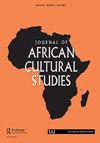骑手和咖啡机:当代纳米比亚的纪念场所和实践
IF 0.9
2区 社会学
Q2 CULTURAL STUDIES
引用次数: 0
摘要
摘要鉴于艺术家和活动家最近的干预,本文探讨了当今纳米比亚围绕殖民纪念碑的关键争论,不仅询问纪念碑能做些什么,还询问纪念碑在彻底打破这个国家的殖民遗产方面有什么局限性。通过纪念碑和纪念性机构激活哪些纪念形式?如何将它们理解为历史的标记以及克服这段历史的建议?本文将首先探讨Reiterdenkmal雕像和“取代”它的独立博物馆的背景和讨论,然后转向其他纪念场所和仪式,这些场所和仪式可能会深入了解当前抗议活动所要求的可能的非殖民化公共和集体进程。本文章由计算机程序翻译,如有差异,请以英文原文为准。
The Rider and the Coffee Maker: Sites and Practices of Remembrance in Contemporary Namibia
ABSTRACT In light of recent interventions by artists and activists, this article explores key contestations around colonial monuments in today’s Namibia and asks not only what monuments can do but also what the limitations are in providing a radical break with the colonial afterlife in this country. What forms of memorialisation are activated through monuments and monumental institutions? How can they be understood as markers of history as well as proposals for overcoming this history? This article will first explore the context of and discourse around the statue of the Reiterdenkmal and the Independence Museum, which “replaced” it, before moving to alternative sites and rituals of remembrance which might give insights into possible public and collective processes of decolonisation – as demanded by the current protests.
求助全文
通过发布文献求助,成功后即可免费获取论文全文。
去求助
来源期刊

Journal of African Cultural Studies
Multiple-
CiteScore
1.70
自引率
10.00%
发文量
13
期刊介绍:
The Journal of African Cultural Studies publishes leading scholarship on African culture from inside and outside Africa, with a special commitment to Africa-based authors and to African languages. Our editorial policy encourages an interdisciplinary approach, involving humanities, including environmental humanities. The journal focuses on dimensions of African culture, performance arts, visual arts, music, cinema, the role of the media, the relationship between culture and power, as well as issues within such fields as popular culture in Africa, sociolinguistic topics of cultural interest, and culture and gender. We welcome in particular articles that show evidence of understanding life on the ground, and that demonstrate local knowledge and linguistic competence. We do not publish articles that offer mostly textual analyses of cultural products like novels and films, nor articles that are mostly historical or those based primarily on secondary (such as digital and library) sources. The journal has evolved from the journal African Languages and Cultures, founded in 1988 in the Department of the Languages and Cultures of Africa at the School of Oriental and African Studies, London. From 2019, it is published in association with the International African Institute, London. Journal of African Cultural Studies publishes original research articles. The journal also publishes an occasional Contemporary Conversations section, in which authors respond to current issues. The section has included reviews, interviews and invited response or position papers. We welcome proposals for future Contemporary Conversations themes.
 求助内容:
求助内容: 应助结果提醒方式:
应助结果提醒方式:


